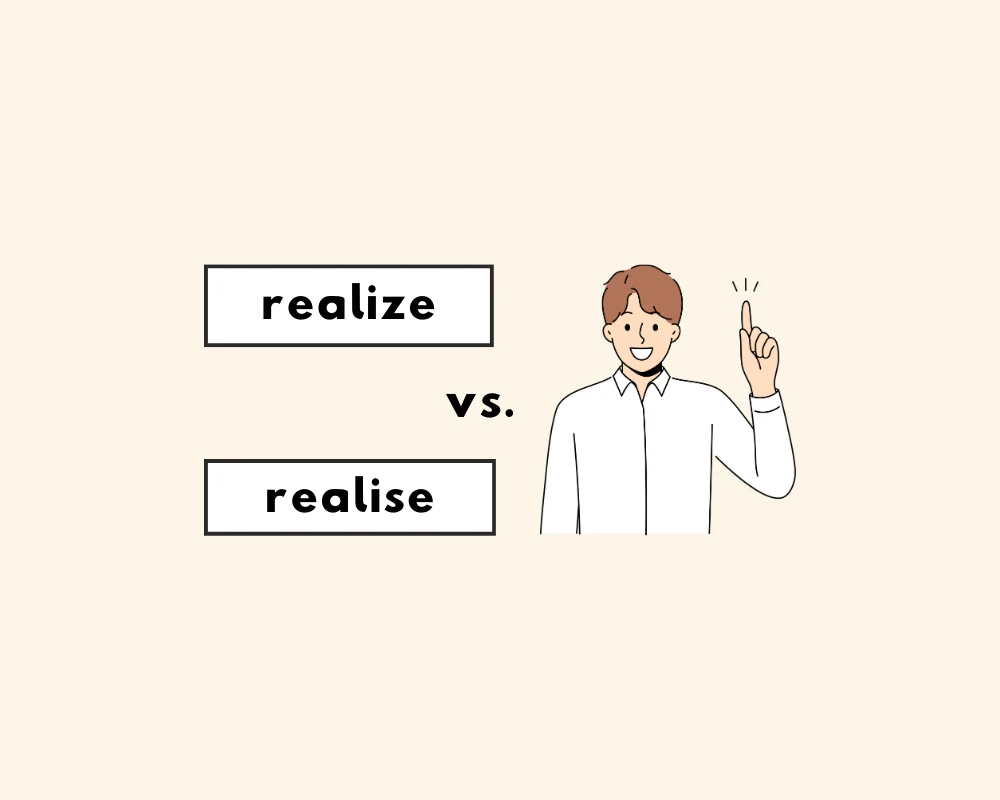Is it “realize” or “realise”?
The verb, to realize, which describes “becoming aware of a particular fact or situation”; “to achieve something important that you very much want to do”; also, to “make real”.
I realized my mistake after reading the contract carefully.
She has realised the importance of saving money.
He has realize his potential.
They realises their goals.
Like a select number of English verbs (and words), the spelling of realize will vary depending on whether you’re using UK English or US English.
- UK English spells “realise” with “-ise”.
- US English spells “realize” with “-ize”.
Other words similar to “realize”/”realise”
| Word Form | Examples |
|---|---|
| Other | UK English US English analyse realise paralyse breathalyse Sierra hopes to realise/realize her dream of writing a novel. I hope you realise/realize the seriousness of this crime. The situation was more complicated than they had at first realised/realized. It is important to realise/realize that there are still potential problems. |
“realize” (US) vs. “realise” (UK), associate the “-ize” spelling with US English, and the “-ise” spelling with UK English.
Examples of realize/realise in the media
| Word Form | Examples |
|---|---|
| Other | After initially joining the team, Scott realized the trajectory his career could take.
His dream—jeans made to the highest standards of Italian luxury, without compromising quality at any stage—continues to be realized with each finished pair of Jacob Cohën denim. After developing lasting symptoms following a COVID infection two years ago, Emma, 34, realized that concentrating on the intricate work of cross-stitching triggered her fatigue. |
“Realize” (or “realise), synonyms
- discover
- see
- learn
- ascertain
- understand
- acknowledge
- observe
- descry (to come upon after searching, study, or effort)
Origin of the word realize
|
1610s, “bring into existence, make or cause to become real,” also “exhibit the actual existence of,” from French réaliser “make real” (16c.), from real “actual”. The sense of “understand clearly, comprehend the reality of” is recorded by 1775. Sense of “obtain, amass, bring or get into actual possession” (money, profit, etc.) is from 1753. —Etymonline |
Read more about US English vs. UK English
- Which is it: “Favorite” or “Favourite”?
- Is it Spelled Metre or Meter?
- Which is Correct: Honour or Honor?
- Is it “Behaviour” or “Behavior”?
- Is it “Labour” or “Labor”?
- Color or Colour (Which is Correct?)
- Favour or Favor (Which is Correct?)
Sources
- “How Jacob Cohën Crafts the Ultimate Luxury Jeans in Italy“, By ROBB REPORT STUDIO.
- “How to Keep Your Creativity Alive When You Have a Chronic Illness“, Anna Borges, February 12, 2024.
- “Descry.” Merriam-Webster.com Thesaurus, Merriam-Webster, https://www.merriam-webster.com/thesaurus/descry. Accessed 18 Feb. 2024.
Worksheet
According to the blog post, which spelling of the verb is typically used in US English?
Which spelling pattern does the blog post associate with UK English?
The blog lists ‘analyse’ as the UK spelling. What is its corresponding US spelling?
Which example sentence for UK English usage is provided in the blog post?
According to the blog, if you are writing in US English, what is the correct present participle form of the verb?
In UK English, the noun form of the verb is _. (realization, realiseation, realisation)
According to the blog, ‘He has realize his potential’ is incorrect. The correct past participle should be _. (realises, realized or realised, realizing)
If writing in US English, the past tense of the verb is _. (realised, realises, realized)
If writing in UK English, the present participle form is _. (realizeing, realising, realizing)
The blog post’s study tip advises associating the ‘-ize’ spelling with _ English. (UK, Canadian, US)
FAQs
What is the spelling difference?
+
Is “realize” used in UK or US English?
+
Is “realise” used in UK or US English?
+
Do other forms like realized use same spelling?
+
What’s a common mistake with usage?
+
Yash, D. "Realize or Realise? How to Spell “Realize”?." Grammarflex, Jun 24, 2025, https://www.grammarflex.com/realize-or-realise-how-to-spell-realize/.










